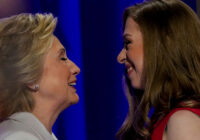“How has the national debt personally affected each of your lives? And, if it hasn’t, how can you honestly find a cure for the economic problems of the common people if you have no experience of what’s ailing them?”
Republican candidate George W. Bush stood and started to answer this question before the chair interrupted him and warned he was digressing. “Help me with the question,” he requested after getting tongue-tied. The questioner wanted to know how he was personally affected. Democratic candidate Bill Clinton took his turn to answer. He stood, walked toward the audience and spoke, not to the audience but to the woman who had asked the question. He motioned to her, his eyes fixed on hers. “In my state, when people lose their jobs, there’s a good chance I’ll know them by their names.”
It was a transformational moment in politics. Of course, we didn’t know it at the time, but on October 15, 1992, at the University of Richmond’s Robins Center, politics changed. The hapless Bush was aloof and seemed almost contemptuous while Clinton interacted relaxedly with the audience without feints or deviations. It was as if he was having private conversations that could be heard, not overheard.
Outside politics, cultural change was turning us all into voyeurs. I don’t mean that people started to take an unwholesome pleasure from watching others engaged in sex or suffering in some way (although some might have). No, the new voyeurism involved the guiltless enjoyment of observing or eavesdropping on private conversations and discovering intimate details of others’ lives, particularly through television and, later, social media. This reflected a growing fascination with the personal and often unfiltered experiences of others. We called it curiosity. It soon extended into politics.
Political celebrities who seem like real people
Celebrity culture was, for many, a Trojan horse: Innocuous-looking enough to allow into our lives but baleful in its consequences. Our captivation with the lives of other people seems perfectly natural now. But it wasn’t in the 1970s. The misleadingly inoffensive horse entered in the 1980s, so that by the early 1990s, it had already taken up residence. Impatient with entertainers who were cautious about sharing details of their private lives, audiences wanted everyone to be like Madonna: unsparing in their distribution of the minutiae of their lives.
Audience appetite was for real people — not the disproportionately impersonal and untouchable godlike characters who dominated public life for most of the 20th century, but people who resembled the other people they were supposed to entertain.
This affected politicians. It seems laughable that we once looked up to them. For most of the 20th century, they were guardians in a benevolent moral and ministerial sense. The electorate admired, respected and, in some cases, idolized these near-transcendent beings. By the 1990s, however, audiences no longer admired politicians from afar; they wanted close-ups. What’s more, they demanded access to their private lives, blurring the lines between public service and entertainment.
Clinton seemed to understand the power of ordinariness. The folksy, down-to-earth charm that characterized him and allowed him to face several accusations of impropriety and an impeachment with equanimity made him one of the most popular presidents in history.
Clinton’s kind of ordinariness became a valuable resource. Audiences responded to politicians who mirrored themselves: They may have had more power, authority, status and attention; they may even have led more opulent lifestyles; but, unlike politicians of earlier eras, the new breed could and probably should exhibit the same kinds of flaws and problems as the people who followed them. So, Clinton’s sex scandals, far from being a source of damnation, worked like a celebrity benediction. There had been sex scandals before, but never anything approaching Clinton’s triple obloquy. The media, which by the early 1990s were ravenous for scandal, covered it extensively.
Related Reading
Bush’s struggle to connect with the audience starkly contrasted with Clinton’s approach, highlighting a shift in what Americans began to value in their leaders. Bush followed Clinton to the White House. He was prone to gaffes, making him the object of parody and criticism, especially after the 9/11 terrorist attacks and the subsequent US invasions of Afghanistan and Iraq.
By contrast, Bush’s successor Barack Obama masterfully balanced the demands of celebrity culture with a scandal-free image, projecting the persona of a cool president. He had suaveness, eloquence and an uncommon ability to connect with a broad range of people, from appearances on talk shows to a preparedness to share his taste in music (he was known to favor Beyoncé, Tyla and Kendrick Lamar.)
Harris, Trump… and Oprah
Obama’s successor, Donald Trump, entered politics as a fully formed celebrity in a similar way to President Ronald Reagan and California Governor Arnold Schwarzenegger — all three were well-known entertainers before their forays into politics. Trump hosted The Apprentice for 14 seasons from 2004 till 2015, so, by the time he won election in November 2016, he was an established figure in the media and popular culture.
Trump may have lacked Clinton’s magnetism and Obama’s relatability, but he could challenge both with his sex scandals and ability to dominate the news cycle. He had little experience in public office but was adept at maneuvering the media. Perhaps he still is. But is his audience still excited? Or are we witnessing Trump fatigue?
Audiences like novelty, freshness and new personalities. If Trump’s celebrity appeal begins to wane, Kamala Harris emerges as a pristine face in American politics. Despite being vice president since 2021, she’s relatively unknown. She’s probably the least-known nominee in living memory. She didn’t even benefit from the exposure of going through primaries. Ironically, this might not be such a bad thing.
Her paradigm will surely be Oprah Winfrey. A proven kingmaker with her pivotal “We need Barack Obama” speech at Des Moines, Iowa on December 8, 2007, Oprah has already given Harris her seal of approval.
Related Reading
As far as I’m aware, there is no celebrity equivalent of osmosis in which style, knowledge and appeal can pass from one person to another. If there were, Harris should learn how it works. Harris’ campaign already has an Oprah feel: The “Joy” theme is confection, though not meaningless confection: It suggests Harris will, if elected, be a person who brings great pleasure and happiness — as celebrities often do.
The most amusing political spectacle in history
It seems frivolous to discuss celebrity culture in the solemn context of politics. But let’s face it: politics is no longer solemn: The dignity that once seemed to ennoble politicians has vanished and whatever they say seems glib or, at best, rehearsed. Small wonder that audiences expect value-for-money entertainment from politics. Politicians, at least the successful ones, know this and often respond in a way that elicits a reaction. Trump has an intuitive grasp of this: His bombastic statements and bumptious behavior guarantee him an expectant audience and a breathless media. His dismissal of a miscellany of accusations with a shrug gives him a certain sheen. He also recruits established showbusiness stars, sometimes to their chagrin (Abba asked Trump to stop playing their music at his rallies).
Like everything else, politics changes. Some might despair at the prospect of politics succumbing to trashy and meretricious celebrity culture. But voters demand it: They want politicians who are as imperfect as they are, empathic enough to be relatable, unpredictable in a way that keeps everyone curious and, above all, entertaining. And, if they’re not, they’re gone: There are plenty of politicians with presidential aspirations who rose to prominence but not for long. Who remembers Deval Patrick, Jim Gilmore or Lincoln Chafee — all hopefuls from recent political history?
Voters are accustomed to being entertained by all manner of celebrity, some weaponized with talent, others just disposable and quickly forgotten. Harris and Trump both want to convince voters that they’re not celebrities but serious politicians. That means much of the campaign will be about trying to command the media’s attention and shape the way it presents the candidates, whether as impressively august with superabundant leadership skills or just pretenders. This guarantees the campaign will deliver a theatrical, extravagant and probably the most amusing political spectacle in history.
[Ellis Cashmore is the author of Celebrity Culture, now in its third edition.]
The views expressed in this article are the author’s own and do not necessarily reflect Fair Observer’s editorial policy.
Support Fair Observer
We rely on your support for our independence, diversity and quality.
For more than 10 years, Fair Observer has been free, fair and independent. No billionaire owns us, no advertisers control us. We are a reader-supported nonprofit. Unlike many other publications, we keep our content free for readers regardless of where they live or whether they can afford to pay. We have no paywalls and no ads.
In the post-truth era of fake news, echo chambers and filter bubbles, we publish a plurality of perspectives from around the world. Anyone can publish with us, but everyone goes through a rigorous editorial process. So, you get fact-checked, well-reasoned content instead of noise.
We publish 2,500+ voices from 90+ countries. We also conduct education and training programs
on subjects ranging from digital media and journalism to writing and critical thinking. This
doesn’t come cheap. Servers, editors, trainers and web developers cost
money.
Please consider supporting us on a regular basis as a recurring donor or a
sustaining member.
Will you support FO’s journalism?
We rely on your support for our independence, diversity and quality.









Comment